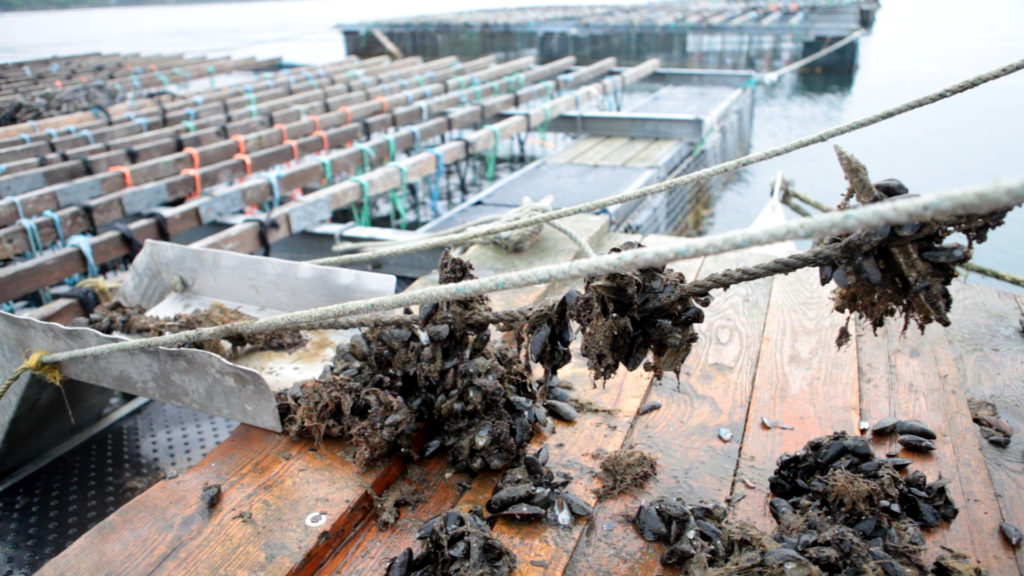Updated 12/10/2015: We now have our cohort! Filter the blog home page by “marine” to read more posts about the Aquaculture cohort.
Work on your small-scale aquaculture business with Island Institute staff support
Aquaculture in Maine—primarily mussels, oysters, and kelp—has huge economic potential. The area covered by all of Maine’s current aquaculture leases could fit inside Rockland harbor, but don’t let the small size fool you: it is a growing industry and the established producers can’t keep up with demand. Maine’s cold, clean, waters can produce a superior product, and when combined with the Maine “brand,” sales are ready to expand throughout the Northeast and beyond.
Why turn to aquaculture, when lobstering is so successful?
Adding aquaculture operations to existing fishing businesses will protect against potential drops in lobster landings. It’s unlikely that the current lobster levels will continue indefinitely, and a forward-thinking lobsterman will be prepared with another source of income. Aquaculture is a natural business expansion for those already working on the water.
Read more about the reasons for getting into aquaculture in this article.

Existing fishermen are well set up to invest in a small aquaculture operation. They’re used to working on the ocean, already own a boat, and know the local waters. Kelp is grown in the winter so it doesn’t have to compete with the fishing season. Growing shellfish in the summer can fit within an existing fishing business.
Like any new venture, it can be tricky to get a lease, find a buyer, and figure out the ins and outs of a new business. To make it more approachable, the Island Institute’s Marine and Economic Development staff will be working with a small group of prospective aquaculturists starting this winter.
We want you (or someone you know) to join us!
We’re looking to work with any Mainers interested in getting into aquaculture, and especially those who already work as fishermen. This will be a valuable program whether you are brand new to marine work or you’ve already started pursuing aquaculture.
Participants must be prepared to invest significant time and energy in exploring their new business, but our staff will provide guidance and resources along the way. Island Institute staff will help members of our Aquaculture Cohort:
- Figure out whether they really want to get into this business
- Connect with existing resources
- Work on a business plan
- Work through the lease application process
- Connect with potential buyers
- Understand gear and how it works
- Go on trips to see operations in Maine and Canada
- Deal with other things that come up
What’s the commitment?
We expect to meet a day or two per month in Rockland this winter, plus occasional phone/video meetings and a couple of exchange trips. Participants will also have to work independently. Ideally, participants will learn enough over the winter to start growing oysters or mussels in spring 2016 or kelp in fall 2016. There may also be the opportunity to participate in one of the comprehensive, in-depth Aquaculture in Shared Waters training classes.


Business-wise, aquaculture is not the same as lobstering. Lobstermen aren’t usually involved in marketing and distribution, but with aquaculture, growers often also sell their product directly. Currently, many aquaculturists in Maine are able to dedicate a lot of their time to farming, marketing, and distribution.
We are especially interested in helping existing fishermen diversify their business by pursuing small-scale aquaculture. Through the connections in this cohort, they will hopefully meet potential wholesale buyers for their product and be able to develop businesses that take advantage of the power of working together. As with lobster coops, having a similar, high-quality product can mean a higher price or more stability in the market for individual fishermen.
We look forward to working with a cohort of fishermen that will help inspire others in the fishing and aquaculture industries. We aim to show that small-scale aquaculture can be widespread and successful, and these participants will serve as inspiration.
Sounds like a good program. What should I do? (applications are now closed).
- For more info and a brief application, download the AQ Cohort Announcement
- Share this opportunity with someone who might be interested.
- Call or email Nick or Bri with any questions—even if you’re only remotely interested.
- Read fact sheets about the business of aquaculture and kelp aquaculture.
_______________________________________________________________________________
Other Marine Economic Development programs and events this fall and winter include marine/fisheries tourism meetings, financial planning workshops for fishermen, and aquaculture community meetings. Click here to learn more: Marine Economic Development Handout.pdf


